Florian Knoll
Andreas Maier
Daniel Rueckert (Eds.)
Machine Learning
for Medical
Image Reconstruction
4
7
0
1
1
S
C
N
L
First International Workshop, MLMIR 2018
Held in Conjunction with MICCAI 2018
Granada, Spain, September 16, 2018
Proceedings
123
�
Lecture Notes in Computer Science
11074
Commenced Publication in 1973
Founding and Former Series Editors:
Gerhard Goos, Juris Hartmanis, and Jan van Leeuwen
Editorial Board
David Hutchison
Lancaster University, Lancaster, UK
Takeo Kanade
Carnegie Mellon University, Pittsburgh, PA, USA
Josef Kittler
University of Surrey, Guildford, UK
Jon M. Kleinberg
Cornell University, Ithaca, NY, USA
Friedemann Mattern
ETH Zurich, Zurich, Switzerland
John C. Mitchell
Stanford University, Stanford, CA, USA
Moni Naor
Weizmann Institute of Science, Rehovot, Israel
C. Pandu Rangan
Indian Institute of Technology Madras, Chennai, India
Bernhard Steffen
TU Dortmund University, Dortmund, Germany
Demetri Terzopoulos
University of California, Los Angeles, CA, USA
Doug Tygar
University of California, Berkeley, CA, USA
Gerhard Weikum
Max Planck Institute for Informatics, Saarbrücken, Germany
�
More information about this series at http://www.springer.com/series/7412
�
Florian Knoll Andreas Maier
Daniel Rueckert (Eds.)
Machine Learning
for Medical
Image Reconstruction
First International Workshop, MLMIR 2018
Held in Conjunction with MICCAI 2018
Granada, Spain, September 16, 2018
Proceedings
123
�
Editors
Florian Knoll
New York University
New York, NY
USA
Andreas Maier
University of Erlangen-Nuremberg
Erlangen
Germany
Daniel Rueckert
Imperial College London
London
UK
ISSN 0302-9743
Lecture Notes in Computer Science
ISBN 978-3-030-00128-5
https://doi.org/10.1007/978-3-030-00129-2
ISBN 978-3-030-00129-2
(eBook)
ISSN 1611-3349
(electronic)
Library of Congress Control Number: 2018953025
LNCS Sublibrary: SL6 – Image Processing, Computer Vision, Pattern Recognition, and Graphics
© Springer Nature Switzerland AG 2018
This work is subject to copyright. All rights are reserved by the Publisher, whether the whole or part of the
material is concerned, specifically the rights of translation, reprinting, reuse of illustrations, recitation,
broadcasting, reproduction on microfilms or in any other physical way, and transmission or information
storage and retrieval, electronic adaptation, computer software, or by similar or dissimilar methodology now
known or hereafter developed.
The use of general descriptive names, registered names, trademarks, service marks, etc. in this publication
does not imply, even in the absence of a specific statement, that such names are exempt from the relevant
protective laws and regulations and therefore free for general use.
The publisher, the authors and the editors are safe to assume that the advice and information in this book are
believed to be true and accurate at the date of publication. Neither the publisher nor the authors or the editors
give a warranty, express or implied, with respect to the material contained herein or for any errors or
omissions that may have been made. The publisher remains neutral with regard to jurisdictional claims in
published maps and institutional affiliations.
This Springer imprint is published by the registered company Springer Nature Switzerland AG
The registered company address is: Gewerbestrasse 11, 6330 Cham, Switzerland
�
Preface
We are proud to present the proceedings of the First Workshop on Machine Learning
for Medical Image Reconstruction (MLMIR), which was held on 16th September 2018
in Granada, Spain, as part of the 21st Medical Image Computing and Computer
Assisted Intervention (MICCAI) conference.
in machine
transform-based
learning. Whereas
Image reconstruction is currently undergoing a paradigm shift that is driven by
or
advances
traditionally
optimization-based methods have dominated methods for
image reconstruction,
machine learning has opened up the opportunity for new data-driven approaches, which
have demonstrated a number of advantages over traditional approaches. In particular,
deep learning techniques have shown significant potential for image reconstruction and
offer interesting new approaches. Finally, machine learning approaches also offer the
possibility of application-specific image reconstruction, e.g., in motion-compensated
cardiac or fetal imaging.
This is supported by the success of machine learning in other inverse problems by
multiple groups worldwide, with encouraging results and increasing interest. Coinci-
dentally, this year is the centenary of the Radon transform and the 250th anniversary
of the birth of Joseph Fourier. The Fourier transform and the Radon transform provide
the mathematical foundation for tomography and medical imaging. It seems appro-
priate and timely to consider how to invert the Radon transform and Fourier transform
via machine learning, and have this workshop serve as a forum to reflect this emerging
trend of image reconstruction research. In this respect, it will frame a fresh new way to
recharge or redefine the reconstruction algorithms with extensive prior knowledge for
superior diagnostic performance.
The aim of the workshop was to drive scientific discussion of advanced machine
learning techniques for image acquisition and image reconstruction, opportunities for
new applications, as well as challenges in the evaluation and validation of ML-based
reconstruction approaches. We were fortunate that Jong Chul Ye (KAIST) and Michael
Unser (EPFL) gave fascinating keynote lectures that summarised the state of the art in
this emerging field. Finally, we received 21 submissions and were able to accept 17
papers for inclusion in the workshop. The topics of the accepted papers cover the full
range of medical image reconstruction problems, and deep learning dominates the
machine learning approaches that are used to tackle the reconstruction problems.
July 2018
Florian Knoll
Andreas Maier
Daniel Rueckert
�
Organization
Workshop Organizers
Daniel Rueckert
Florian Knoll
Andreas Maier
Imperial College London, UK
New York University, USA
University of Erlangen, Germany
Scientific Programme Committee
Bernhard Kainz
Bho Zhu
Bruno De Man
Claudia Prieto
Dong Liang
Enhao Gong
Essam Rashed
Ge Wang
Greg Zaharchuk
Guang Yang
Jo Schlemper
Jonas Adler
Jong Chul Ye
Jose Caballero
Jo Hajnal
Joseph Cheng
Mariappan Nadar
Matthew Rosen
Michiel Schaap
Morteza Mardani
Ozan Öktem
Rebecca Fahrig
Simon Arridge
Thomas Pock
Tobias Wuerfl
Imperial College London, UK
Havard University, USA
GE, USA
King’s College London, UK
Chinese Academy of Sciences, China
Stanford University, USA
British University in Egypt, Egypt
Rensselaer Polytechnic Institute, USA
Stanford University, USA
Royal Brompton Hospital, UK
Imperial College London, UK
Royal Institute of Technology, Sweden
KAIST, South Korea
Twitter, UK
King’s College London, UK
Stanford University, USA
Siemens Healthcare, USA
Havard University, USA
HeartFlow, USA
Stanford University, USA
Royal Institute of Technology, Sweden
Siemens Healthcare, Germany
University College London, UK
Graz University of Technology, Austria
Friedrich-Alexander-University Erlangen-Nuremberg,
Tolga Cukur
Bilkent University, Turkey
Germany
�
Contents
Deep Learning for Magnetic Resonance Imaging
Deep Learning Super-Resolution Enables Rapid Simultaneous
Morphological and Quantitative Magnetic Resonance Imaging . . . . . . . . . . .
Akshay Chaudhari, Zhongnan Fang, Jin Hyung Lee, Garry Gold,
and Brian Hargreaves
ETER-net: End to End MR Image Reconstruction Using Recurrent
Neural Network . . . . . . . . . . . . . . . . . . . . . . . . . . . . . . . . . . . . . . . . . . .
Changheun Oh, Dongchan Kim, Jun-Young Chung, Yeji Han,
and HyunWook Park
Cardiac MR Motion Artefact Correction from K-space Using Deep
Learning-Based Reconstruction . . . . . . . . . . . . . . . . . . . . . . . . . . . . . . . . .
Ilkay Oksuz, James Clough, Aurelien Bustin, Gastao Cruz,
Claudia Prieto, Rene Botnar, Daniel Rueckert, Julia A. Schnabel,
and Andrew P. King
Complex Fully Convolutional Neural Networks for MR
Image Reconstruction . . . . . . . . . . . . . . . . . . . . . . . . . . . . . . . . . . . . . . .
Muneer Ahmad Dedmari, Sailesh Conjeti, Santiago Estrada,
Phillip Ehses, Tony Stöcker, and Martin Reuter
Magnetic Resonance Fingerprinting Reconstruction via Spatiotemporal
Convolutional Neural Networks . . . . . . . . . . . . . . . . . . . . . . . . . . . . . . . .
Fabian Balsiger, Amaresha Shridhar Konar, Shivaprasad Chikop,
Vimal Chandran, Olivier Scheidegger, Sairam Geethanath,
and Mauricio Reyes
3
12
21
30
39
Improved Time-Resolved MRA Using k-Space Deep Learning . . . . . . . . . . .
47
Eunju Cha, Eung Yeop Kim, and Jong Chul Ye
Joint Motion Estimation and Segmentation from Undersampled
Cardiac MR Image . . . . . . . . . . . . . . . . . . . . . . . . . . . . . . . . . . . . . . . . .
55
Chen Qin, Wenjia Bai, Jo Schlemper, Steffen E. Petersen,
Stefan K. Piechnik, Stefan Neubauer, and Daniel Rueckert
Bayesian Deep Learning for Accelerated MR Image Reconstruction . . . . . . .
64
Jo Schlemper, Daniel C. Castro, Wenjia Bai, Chen Qin, Ozan Oktay,
Jinming Duan, Anthony N. Price, Jo Hajnal, and Daniel Rueckert
�
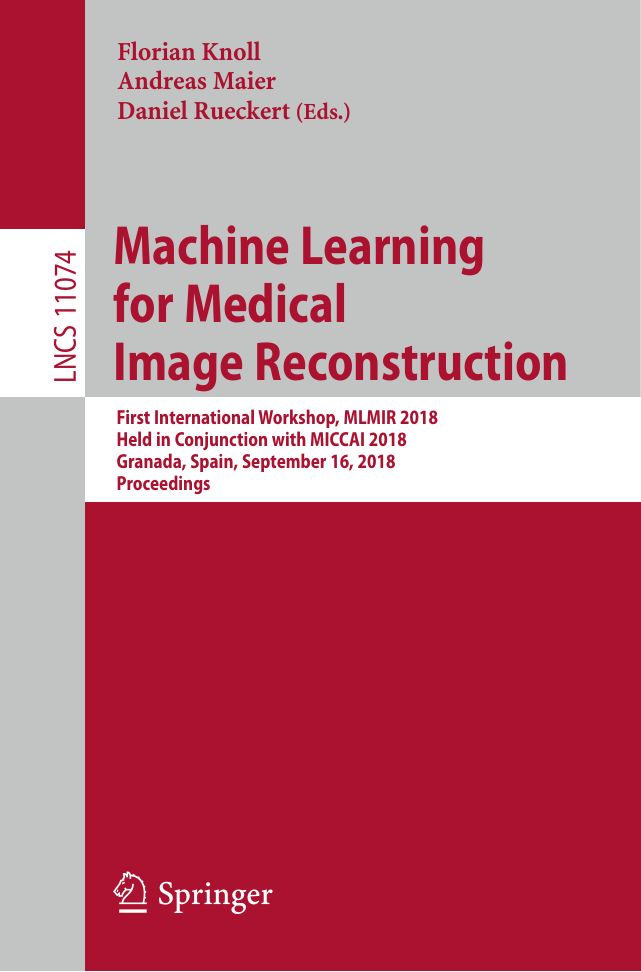
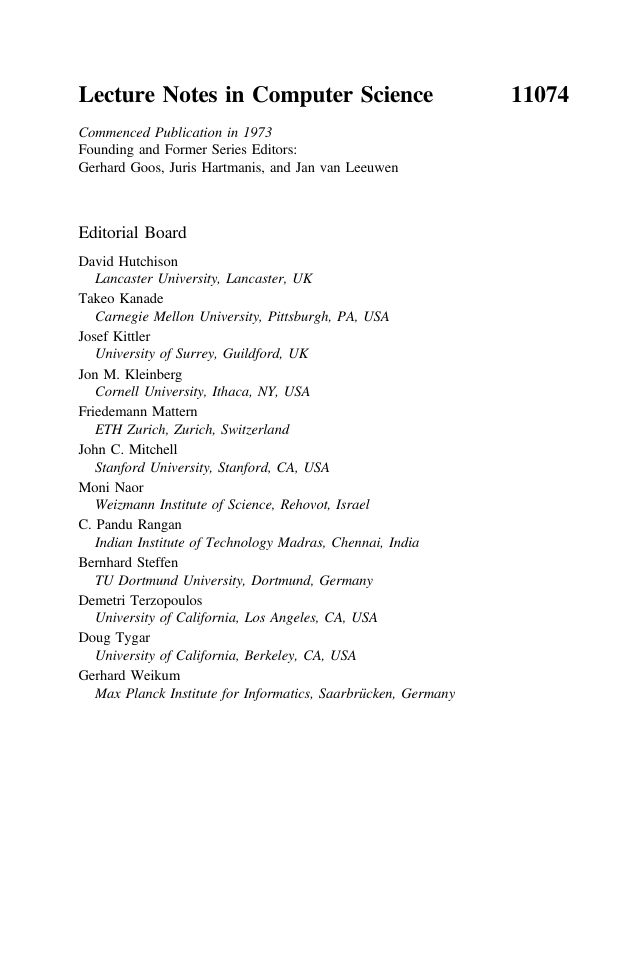

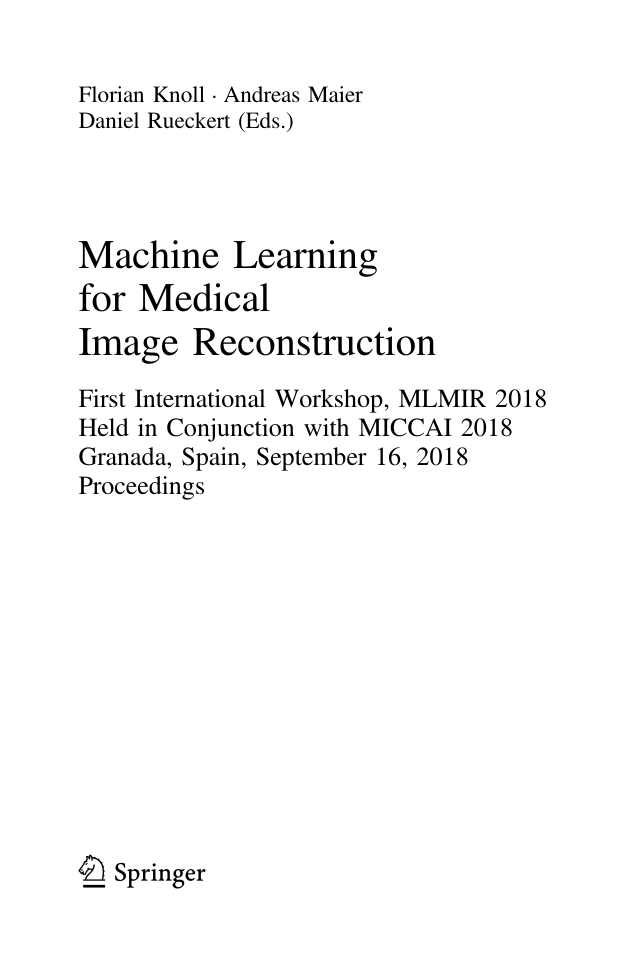
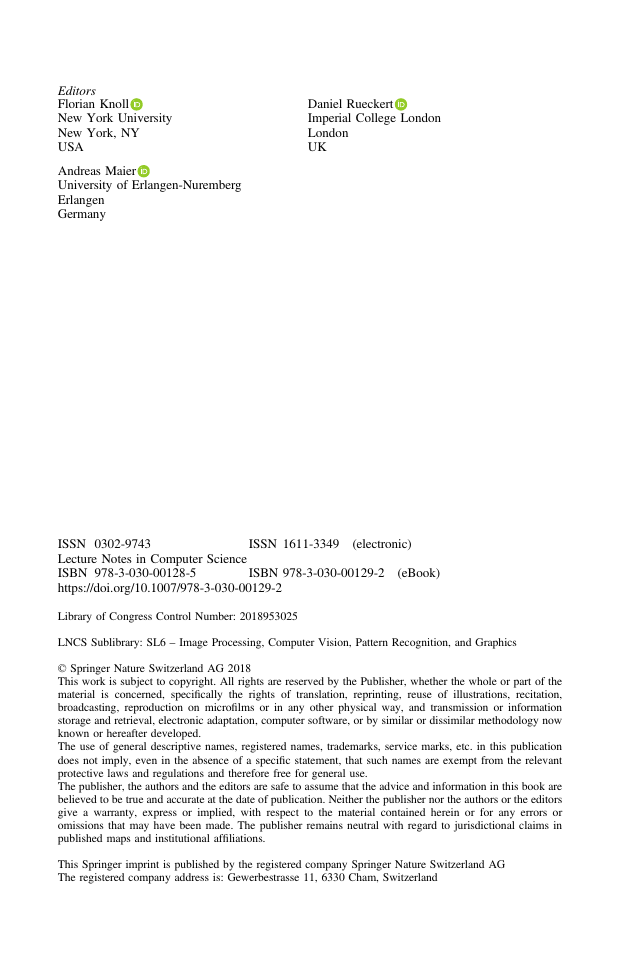
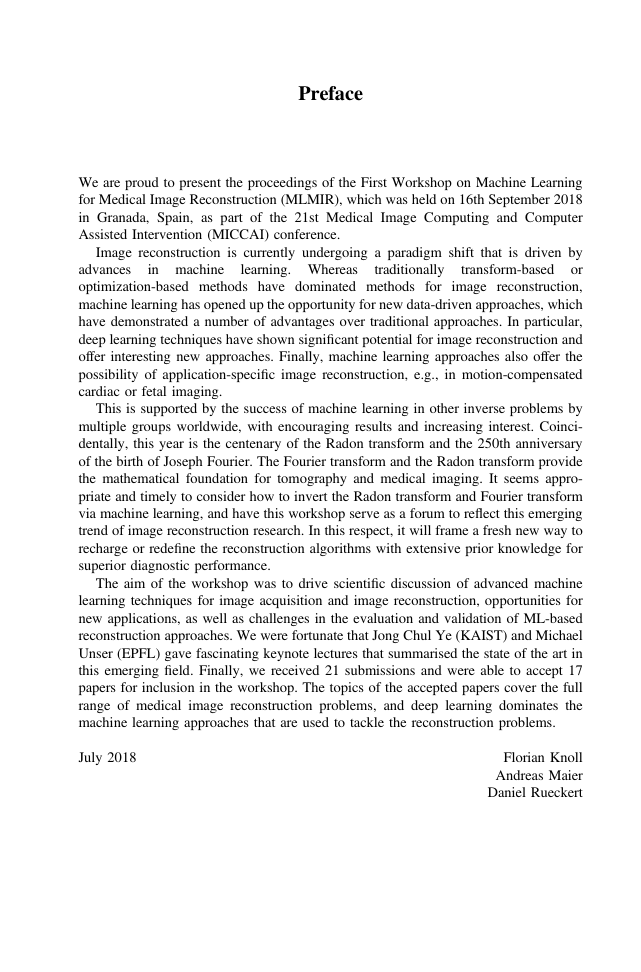
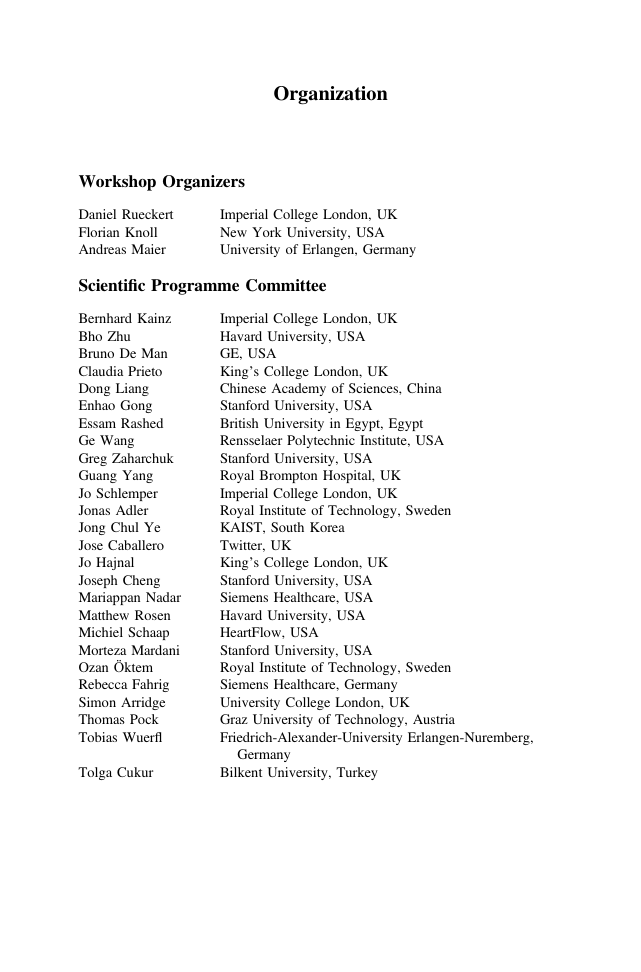
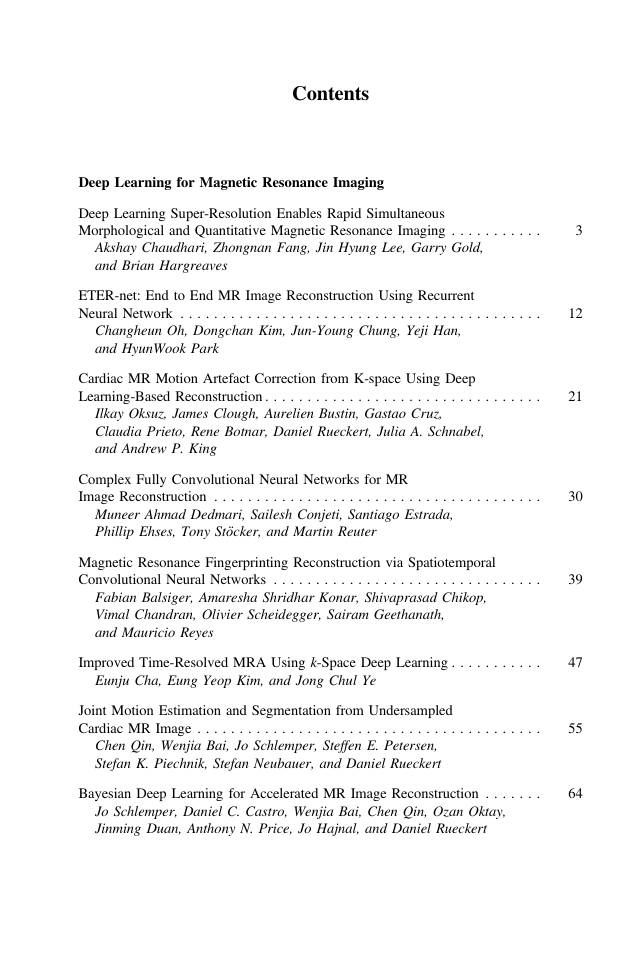








 2023年江西萍乡中考道德与法治真题及答案.doc
2023年江西萍乡中考道德与法治真题及答案.doc 2012年重庆南川中考生物真题及答案.doc
2012年重庆南川中考生物真题及答案.doc 2013年江西师范大学地理学综合及文艺理论基础考研真题.doc
2013年江西师范大学地理学综合及文艺理论基础考研真题.doc 2020年四川甘孜小升初语文真题及答案I卷.doc
2020年四川甘孜小升初语文真题及答案I卷.doc 2020年注册岩土工程师专业基础考试真题及答案.doc
2020年注册岩土工程师专业基础考试真题及答案.doc 2023-2024学年福建省厦门市九年级上学期数学月考试题及答案.doc
2023-2024学年福建省厦门市九年级上学期数学月考试题及答案.doc 2021-2022学年辽宁省沈阳市大东区九年级上学期语文期末试题及答案.doc
2021-2022学年辽宁省沈阳市大东区九年级上学期语文期末试题及答案.doc 2022-2023学年北京东城区初三第一学期物理期末试卷及答案.doc
2022-2023学年北京东城区初三第一学期物理期末试卷及答案.doc 2018上半年江西教师资格初中地理学科知识与教学能力真题及答案.doc
2018上半年江西教师资格初中地理学科知识与教学能力真题及答案.doc 2012年河北国家公务员申论考试真题及答案-省级.doc
2012年河北国家公务员申论考试真题及答案-省级.doc 2020-2021学年江苏省扬州市江都区邵樊片九年级上学期数学第一次质量检测试题及答案.doc
2020-2021学年江苏省扬州市江都区邵樊片九年级上学期数学第一次质量检测试题及答案.doc 2022下半年黑龙江教师资格证中学综合素质真题及答案.doc
2022下半年黑龙江教师资格证中学综合素质真题及答案.doc